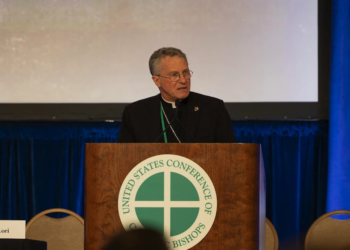ACI Prensa Staff, Aug 22, 2025 /
15:42 pm
In early August, President Luis Abinader promulgated the Dominican Republic’s new penal code, a law that replaces legislation more than a century old and will come into effect in August 2026.
The approved text incorporates crimes such as “femicide,” contract killings, cyberbullying, economic violence, pyramid schemes, kidnapping, crimes against humanity, and genocide. It also increases maximum prison sentences up to 60 years for serious crimes.
However, one of the most significant aspects is that it maintains the absolute ban on abortion, a milestone for the Dominican pro-life movement.
‘A code that enshrines the inviolability of life’
Father Mario de la Cruz Campusano, episcopal vicar for Family and Life Ministry of the Archdiocese of Santo Domingo, expressed his gratitude for the passage and promulgation of the new penal code.
“We want to recognize the great work of the [representatives] and senators in approving a code that enshrines the inviolability of life. Likewise, we thank President Luis Abinader for listening to us and enacting this law that the vast majority of the Dominican people requested and needed,” he stated in a video posted on social media.
The priest emphasized that the new legislation “resolves many problems needing attention with regard to the penal code, classifies new crimes, increases penalties where necessary, and introduces provisions not addressed in the previous legislation.”
In an interview with ACI Prensa, CNA’s Spanish-language news partner, Damaris Patrocinio, president of the Forum of Women in Defense of Life and the Family, (FOMUDEVI by its Spanish acronym) stated that this victory “has been the fruit of a decades-long struggle.”
“They say that every era has its battles and every battle has its warriors. FOMUDEVI would not have been a key component in this phase for the passage of the constitutional penal code if the great warriors who preceded us more than 25 years ago had not laid the foundations for the defense of life,” she stated.
The pro-life leader recalled names such as Pelegrín Castillo, Mercy Núñez de Avilés, Bishop Víctor Masalles, the late Father Luis Rosario, and other advocates “who passed the generational torch to us.”
A joint effort by experts
Patrocinio explained that in January, FOMUDEVI called on five lawyers who “worked on amendments to the current penal code on a pro bono basis.” These jurists — Fabio Caminero, Carolina Moreno, Laura Félix, Katerine Gómez Hernández, and Martha Jáquez — drafted and revised articles to strengthen the protections for life and family.
Among the key provisions, she highlighted, “abortion was maintained, fully criminalized, as established by the constitution in Article 37.” At the same time, an exemption was added, stating: “The termination of pregnancy performed by specialized health personnel will not be punished if, to save the life of the mother, the fetus, or both in danger, all available means at the time of the event are exhausted.”
“What was done was to include in the law what was already addressed in a medical protocol of the Ministry of Public Health,” Patrocinio explained.
Regarding the family, the pro-life leader emphasized that “it remains untouchable, since the constitution establishes in Article 55 that marriage is between one man and one woman.”
Conscientious objection and new crimes
(Story continues below)
Subscribe to our daily newsletter
The leader also welcomed the inclusion of two paragraphs on conscientious objection.
“Conscientious objection entails important social and legal consequences. It is a person’s right to refuse to fulfill a legal obligation when said obligation profoundly contradicts their moral, ethical, or religious convictions,” she noted.
Regarding the inclusion of new crimes, Patrocinio acknowledged progress and nuances: Adding “‘contract killings’ was an achievement, as these crimes have been on the rise in the Dominican Republic. We believe that cyberbullying has room for improvement in its wording. Economic violence, on the other hand, is subjective and more susceptible to the manipulated gender agenda and the 2030 agenda,” she commented.
Criticisms and challenges
Regarding those in society who take issue with the prohibition of abortion, Patrocinio was emphatic: “For them, the only perfect code would be one that contains only three articles: first, unrestricted abortion in all its forms, including infanticide; second, sexual orientation for the purpose of indoctrinating children; and third, an article that eliminates our sovereignty,” she stated.
Facing the year of “vacatio legis” (the period of time between the publication of a law and its going into effect), the president of FOMUDEVI anticipates some challenges: “We have a great opportunity to improve what has already been passed; not to add anything new but to adapt penalties, eliminate articles, or improve wording.”
Asked about the risk of attempting to introduce changes, she pointed out that “this danger will always be latent, because pro-abortion groups continue to receive significant funding from international organizations.”
Along the same lines, Martharís Rivas, coordinator of 40 Days for Life in the Dominican Republic, emphasized that the group will continue “praying for this ‘vacatio legis’ so that life and family continue to be defended in the Dominican penal code.”
Finally, Patrocinio reiterated FOMUDEVI’s commitment to the transition process, saying the organization will remain “on high alert for any attempt to modify what was passed.”
“This has been a severe blow to the head of the serpent of the groups involved in the industry of death, who were defeated and crushed to their shame,” she noted.
With the passage of the law in the Chamber of Deputies (lower house) by a margin of 159-4 and with 27-1 in the Senate, the new Dominican penal code marks a before and after in the country’s legislative history.
This story was first published by ACI Prensa, CNA’s Spanish-language news partner. It has been translated and adapted by CNA.


















